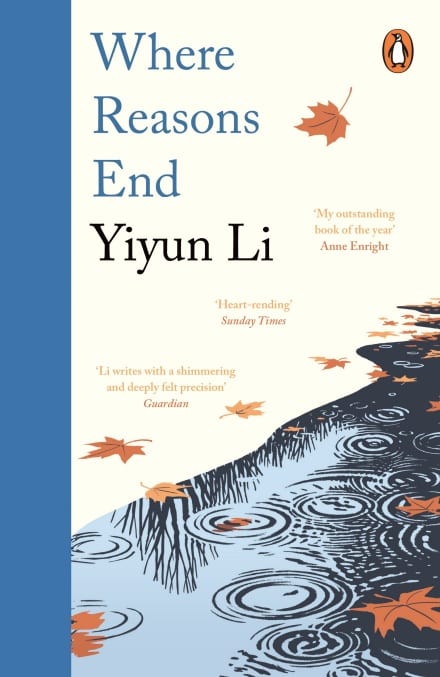
Yiyun Li took inspiration from her own experiences with child loss for “Where Reasons End.”
Credit: Penguin Random House UK
I firmly believe you are supposed to consume “Where Reasons End” in the late (or early) hours engrossed in the dialogue Yiyun Li spins out of thin air, where the quiet, liminal space allows for the narrator’s circumstance to become your own.
I don’t recommend you consume a bottle of red wine along with the words, but those lessons are learned the hard way.
Whatever state one is in when reading Yiyun Li’s 2019 novel “Where Reasons End,” it is a heartbreaking force of fiction. Written in the months after Li’s son’s suicide, the book grapples with guilt and grief without feeling like a list of conversations Li wishes she had, but rather a continuation of the relationships — mother/son, friend/enemy — she sought to maintain.
The novel is sparse: two characters with dialogue, only one given a name, and a complete abandonment of physical setting. Instead, we are taken into a conversation between a mother and her son, Nikolai. But Nikolai is said to have died some weeks ago. Where the unnamed narrator tells us she “had once gave Nikolai a life of flesh and blood [she’s] doing it over again, this time by words.”
The two clash like similarly polarized magnets, an expression readers will come to know that draws the ire of the whip-smart — and at times arrogant — Nikolai. Their clashes over proper writing form can be read as much as ideological differences between mother and son as they are Li grappling with the appropriate way to dispense of her grief on the page. At one point the mother settles, positing “all words are indispensable, don’t you agree?” without allowing her son to return an answer.

Li is a short story author, novelist and essayist. She’s the recipient of many awards, including a PEN/Hemingway Award, a PEN/Jean Stein Book Award, a MacArthur Foundation fellowship and a Windham-Campbell Prize.
Credit: The Irish Times
While ruminations on language are featured throughout the book, the emotional crux is found in poking around the narrator’s grief, the raw “wound that stays open always.”
Li has made a one-sided, endlessly spiraling interior monologue into a rhythmic back-and-forth with a friend and foil in Nikolai. He doesn’t initiate the conversation, he’s metaphysically incapable, but he pushes the narrator beyond the simple, complacent renderings of grief and self-doubt that feel scripted into honest emotion.
“I wish you had made me an enemy, I said, rather than yourself. Mothers. I thought, would be perfect for the role.
You can’t be that for me, Mommy, Nikolai said. I’ve found the perfect enemy in myself.”
While you grapple with the rules and contradictions in the space where mother and son are reunited, you unwind her attempts to understand her son’s pain and her own.
Li is not a stranger to the kind of pain that drives people to leave their loved ones behind, suffering from her own suicide attempt in 2012. In the aftermath of her son Vincent’s suicide in 2017, she wrote a memoir, “Dear Friend, from My Life I Write to You in Your Life,” which could be read as a companion in sorrow.
Grief should never be measured by what can be produced out of it. Hairol Ma, a very talented young writer, noted in a recent newsletter, “Sometimes all we can manage is to suffer quietly. And that is enough.” But if what comes out of grief can be measured by how closely it communicates the emotion in totality, then “Where Reasons End” may be worthy of perfectionist Nikolai’s admiration.

 Where Reasons End by Yiyun Li
Where Reasons End by Yiyun Li


 How Dare You Die Now!
How Dare You Die Now!
 Debating Medical Aid in Dying
Debating Medical Aid in Dying
 “Help Me, Helen”
“Help Me, Helen”














